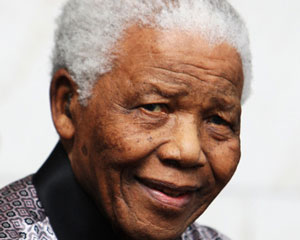
by tim middleton
Nelson Mandela received over 260 awards of varying types from all around the world, including numerous honorary doctorates, plenty of freedoms of different cities, citizenship in many countries, plus many roads, parks, squares being named after him, but most notably, no doubt, the Nobel Peace Prize. Why did he receive all these awards? He received them, on account of his fight against apartheid which saw him imprisoned for almost thirty years — he was a freedom fighter who fought not for his own freedom, but, for that of his own people, a point reflected in a quote of his on a wall of the Contemplative Court in the Smithsonian’s National Museum of African American History and Culture: “I cherish my own freedom dearly, but I care even more for your freedom.” However, he also is quoted as saying pertinently and perceptively, “A man does not become a freedom fighter in the hope of winning awards.”
This latter quote is worth some scrutiny. Firstly, why does one become a freedom fighter? There are no desks at Career Fairs calling for young people to pursue such a career! We will not find anyone writing down “Freedom Fighter” on a questionnaire under the section entitled “Occupation”. There are not many universities offering courses in freedom fighting. Parents are very quick to exhort their children to become a doctor or architect or lawyer or accountant but few will encourage their child to join the profession of freedom fighter. So why does a man become a freedom fighter?
The answer is very obvious but needs to be stated. He does so because of what he believes, what he stands for. A freedom fighter acts because he wants to leave a legacy, not to win an award. He wants to leave the world a better place, not to line his pockets. He focuses on the cause, not on the prize. He cares for others’ freedom. Mandela was absolutely correct: A man does not become a freedom fighter to win an award. After all, we might quietly and momentarily reflect that Martin Luther King Junior did not exactly win many awards during his lifetime, only a bullet.
At this time of the year when schools are handing out awards at speech days and sports dinners, we might, secondly, consider why we give awards.
Generally, we delight in giving awards for pupils who perform better than others in different areas of school life. However, one thing is for sure: not many schools have an award for freedom fighter of the year! In fact, the person who might qualify for such an award would probably have been excluded from school during the year!
We do well, therefore, to remind our young people that a real man does not do things for the reward, for the prize, but for the cause, for the people. Mandela certainly did not act as he did, throughout his whole life, with the aim of winning awards. The real freedom fighter does not actually care about the awards. By all means receive the award but make sure the motive for doing the actions is valid and worthy and for others. Mandela explained that he “never cared very much for personal prizes… but when I was notified that I had won the 1993 Nobel Peace Prize jointly with de Klerk, I was deeply moved.
The award was a tribute to all South Africans and especially to those who fought in the struggle; I would accept it on their behalf.” Freedom was the reward for their labours. What then was Mandela saying? Awards may be great but they are not the be-all-and-all, nor are they the focus or the purpose of our efforts. We need to do things for the right reasons.
- Chamisa under fire over US$120K donation
- Mavhunga puts DeMbare into Chibuku quarterfinals
- Pension funds bet on Cabora Bassa oilfields
- Councils defy govt fire tender directive
Keep Reading
Too many awards are for actions that are purely self-centred. We would do well, therefore, to reflect on a scene in the powerful film Amazing Grace, when the character Lord Charles Fox summed up the life of another great freedom fighter, William Wilberforce, following his success in parliament to abolish slavery: “When people speak of great men, they think of men like Napoleon – men of violence. Rarely do they think of peaceful men. But contrast the reception they will receive when they return home from their battles. Napoleon will arrive in pomp and in power, a man who’s achieved the very summit of earthly ambition. And yet his dreams will be haunted by the oppressions of war. William Wilberforce, however, will return to his family, lay his head on his pillow and remember: the slave trade is no more.” The fight for freedom had been won. We do better to be freedom fighters (or “humanitarian reformer”, as Wilberforce was recognised) than fame seekers. That would be the noblest prize, the highest award.
Tim Middleton is the executive director of the Association of Trust Schools [ATS]. The views expressed in this article, however, are solely those of the author in his private capacity and do not necessarily represent the views of the ATS.











